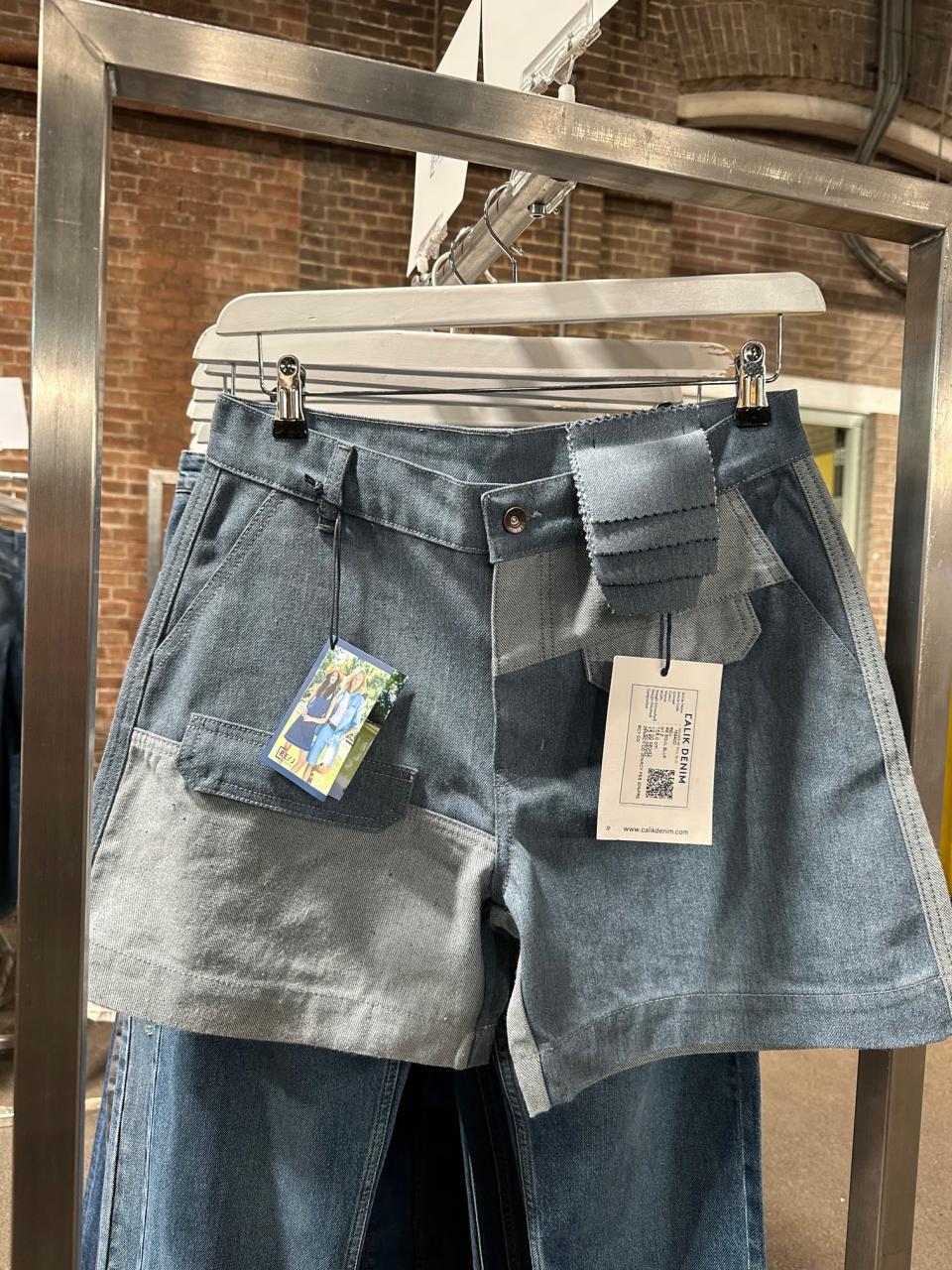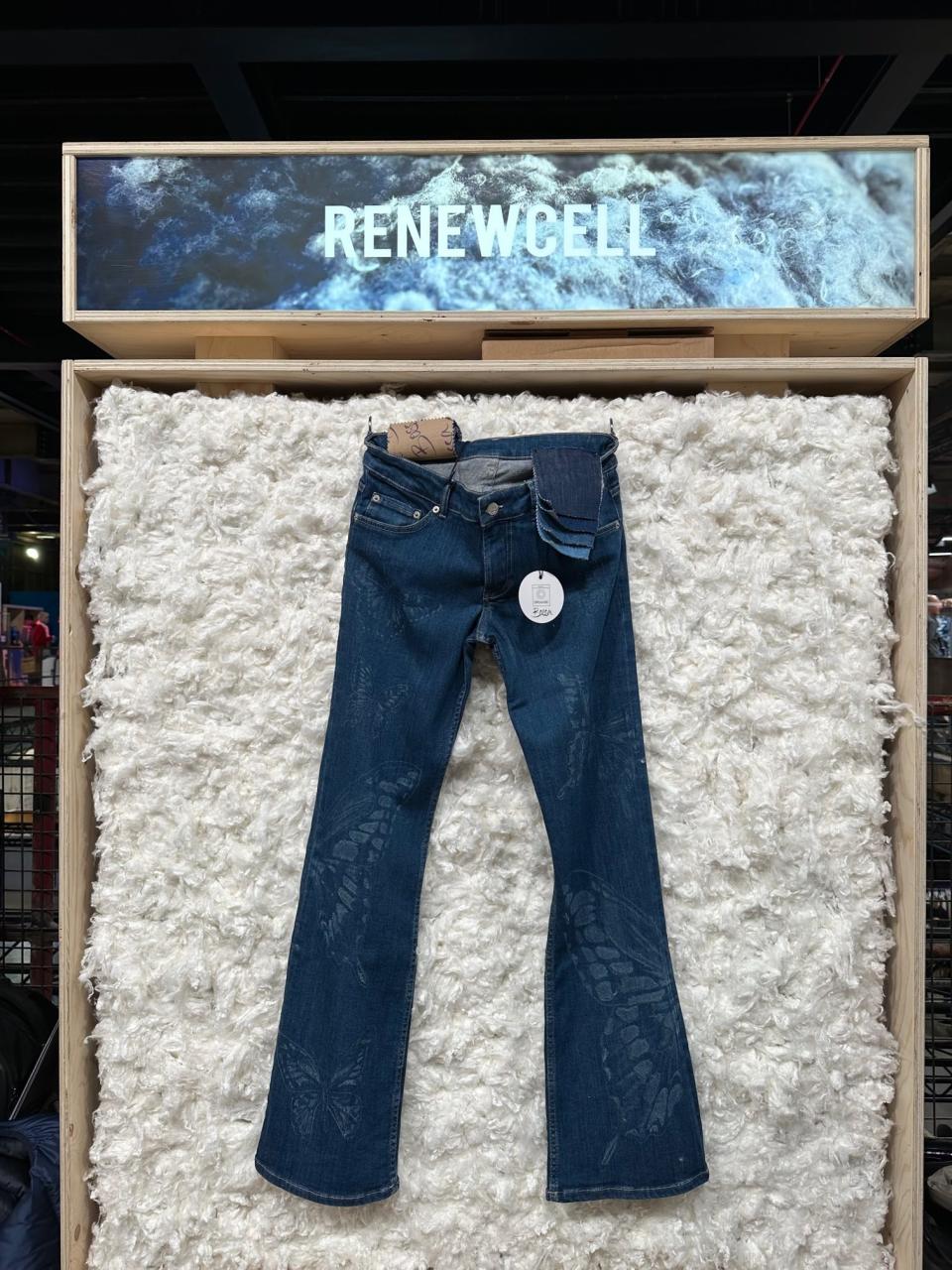‘Fiber Salads’ and Circular Solutions Innovate Spring/Summer 2025 Denim

Even if in small amounts, mills are exploring new and innovative ingredients in their Spring/Summer 2025 collections.
AGI Denim celebrates its 30th anniversary with Tomorrowlab, a fabric collection developed with Levi’s former head of design Jonathan Cheung that prioritizes next-gen ingredients.
More from Sourcing Journal
At Kingpins Amsterdam, Cheung described the fabrics as “fiber salads” made with post-industrial and post-consumer recycled cotton, Regenagri-certified regenerative cotton, Tencel with Refibra technology, Renewcell’s Circulose pulp made from recycled textiles, Earthshot Prize finalist Circ, Infinna from Infinited Fiber and Hyosung’s Creora Regen, a 100 percent recycled spandex made of plastic waste.
Tomorrowlab also marks the first commercial use of startup Huue’s bio-based indigo made by microbial processes.
The purpose of Tomorrowlab, Cheung added, is to make sustainability accessible without compromising quality and to give “science soul.”
Traceable cotton from carbon-positive Good Earth Cotton, viscose made with Circulose, and Nature Coatings’ BioBlackTX derived from industrial wood waste were among the forward-thinking ingredients used in Orta’s collection. The mill finished garments with HMS Original, an emerging alternative to pumice stones. The reusable composite stones are made with recycled materials. Different size stones create different results and are customizable to client needs. The stones were also used by Bossa.
Orta also introduced a softener derived from used cooking oil collected at restaurants.
Banana fibers grown in Pakistan are unique to Neela by Sapphire Fibers’ collection. The company teamed with Interloop, which is working with a Pakistani university to grow bananas and extract the fiber for textiles. Neela weaves and dyes the fiber that’s spun by Interloop. Fabrics contain 20 percent banana fiber, 88 percent cotton and 2 percent Tencel.
ADM’s ongoing partnership with Recover has opened the window of opportunity for other circular fibers. In addition to recycled cotton, the S/S ’25 collection includes fabrics made with Tex2Tex recycled polyester and Circulose. The ingredients are used to make fabrics based on the vintage looks that continue to dominate the market.
Calik is overcoming obstacles in circularity. With Re/J, the mill offers a line of denim made with 100 percent pre- and post-consumer recycled cotton. Compared to other recycled fabrics, the mill says its unique technology allows it to achieve authentic denim looks and options with elasticity. Re/J also includes value-added recycled fibers such as ECOLycra and Repreve. To maximize the fabric’s sustainable footprint, the fabric family uses Calik’s zero water and chemical waste-free dye technology, Dyepro.

Additionally, the first garments made with B210 technology, a combination of unique yarn technology and a special finishing process enabling fabrics to biodegrade in nature in 210 days, will be entering the market soon. It can be applied to fabrics containing synthetic fiber and all types of elasticity and non-denim textiles as well.
Regenerative farming continues to be a focus for Calik, which reports that 10 percent of its contracted farmers are producing cotton using regenerative practices. The mill is an advocate for the Better Cotton Initiative. Calik participated in a field trip organized by BCI earlier this month to Turkey’s cotton fields. During the event, representatives from Marks & Spencer, Varner, New Look, Beymen and Mavi had the opportunity to see all production processes from cotton farming to the final stage of fabric production at sister company Calik Cotton’s mill in Malatya, Turkey.
Regenerative cotton, colored cotton and Circulose are notable fiber ingredients in Bossa’s collection. In a sea of blue, the mill is seeing growing interest in novelty fabrics with unique weaves and high-tactile surfaces. Jacquards, corduroy, stripes, pajama-like fabrics and natural fabrics with glitter are standout items.

Candiani, Artistic Milliners and Prosperity Textiles are using Roica by Asahi Kasei’s degradable elastane, Roica V550, in select products.
Though Candiani has developed Coreva, a biodegradable and compostable stretch denim, the Italian mill uses Roica V550 is its ReSolve collection. It is blended with GOTS-certified organic cotton and Regenagri-certified regenerative cotton. ReSolve fabrics are currently used by German brand Closed.
The Cradle-to-Cradle certified ingredient is part of Artistic Milliners’ Earthcore line of Jeans Redesign-compliant fabrics. The fabrics are dyed with the mill’s proprietary salt-free technology called Crystal Clear 2.0. Prosperity uses Roica V550 in its Leave No Trace line, blending the yarn with recycled cotton to promote circularity.
To meet the needs of the denim market, Roica bowed a chlorine-resistant version called Roica EF. The yarn is made from 35 percent in-house pre-consumer waste and can offer better durability under chlorine conditions.
Lycra is preparing to launch its biodegradable product, Lycra fiber made with Qira, by the end of 2024. The elastane producer remains laser-focused on creating solutions for comfort and flexibility, however.
The company’s new bi-stretch fiber technology, Lycra Xfit, results in garments that have hidden 360-degree stretch without the compression of conventional bi-stretch denim. By using looms with double beam capability, Lycra fiber is buried inside the fabric. This allows the fabric to have stretch and recovery benefits and a natural cotton aesthetic instead of the gummy texture of traditional bi-stretch denim. Any kind of warp indigo yarn and weft yarn can be used to create various fabric types.
Lycra Xfit was previously only available in China, but more mills in Pakistan are investing in double beam looms.
Lenzing’s effort to promote matte Tencel for the men’s denim market came to fruition with a collection of bottom-weight fabrics from 13 global mill partners. The Matte Tencel Denim Capsule Collection includes fabrics made with a minimum of 40 percent matte Tencel, the low-luster version of Tencel lyocell initially pitched to the women’s market.
Tuncay Kilickan, Lenzing’s head of global business development, denim, said he set the minimum at 40 percent for the collection to deliver the biggest benefits in terms of sustainability, texture and performance. “If you use only 10 percent [matte Tencel], you don’t see a big benefit than using standard Tencel,” he said.
With cotton prices higher than the cost of Tencel, he added that it is essential to have scalable options available for clients.
One of those options is Japanese denim made with Tencel. Japanese denim manufacturer Kaihara recently joined forces with Lenzing to make a line of seven premium fabrics with global appeal. The Kaihara x Tencel collection offers fabrics with zero or reduced cotton leveraging Tencel fibers for their sustainability. Others are made with Tencel Modal fiber with Indigo Color technology to save water in the dyeing process. The fabrics were finished using Jeanologia’s technology.
Hirofumi Inagaki, Kaihara executive officer, general manager of sales, said the mill’s long-standing partnership with Lenzing is “pivotal to advancing our commitment to responsible practices” and the company’s overseas expansion strategy.
Zero-cotton fabrics like 100 percent lyocell, lyocell and recycled polyester blends, and fabrics that use more lyocell, linen, hemp, bamboo and recyclable materials to decrease the use of virgin cotton are part of Twin Dragon Marketing Inc.’s (TDMI) collection. Demand for comfort is also driving the mill to use special spinning techniques to create fabrics with a soft, velvet-like touch.
This year’s unpredictable weather patterns are influencing denim as well.
With Atmos, TDMI uses Toray’s Airlet hollow polyester to reduce the weight of fabrics for men and women. The fiber has dual functionality, keeping jeans feeling airy in the summer and cozy in the winter, and is 200 times more durable than fabrics without it. Soft and spongey, it adds density to white denim, preventing fabrics from being see-through.
Naveena Denim Mills uses linen and recycled linen blends to enhance the breathability and moisture-wicking properties of fabrics. The Pakistani mill is also growing its assortment of drapey, lightweight fabrics (7.5-8 oz.) that offer the authentic character of heavier materials. Artistic Milliners also uses up to 35 percent industrial waste recycled linen in its Free Flow collection.
Solve the daily Crossword

